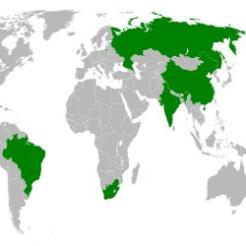Neelam Makhijani welcomes the emergence of a development bank for BRICS nations, with trepidation.
An idea conceived by, and rooted in, five emerging nations that between them represent over 40 per cent of the world’s population and nearly a fifth of its trade, it is difficult not to share the immense interest, and excitement, that has greeted the announcement of a BRICS development bank. And share it I do.
The agreement reached in Durban, South Africa late last month sees Brazil, Russia, India, China and South Africa enter into formal negotiations to establish an institution that will provide initial funding for infrastructure projects – roads, railways and so on – worth $4.5bn (£3bn).
It is the realisation of an amazing idea, previously unthinkable outside post-war North American orthodoxy. We’re not in Bretton Woods anymore.
Proposed seed capital for the bank is understood to be in the region of $50bn, with a further reserve fund of $100bn to insulate member states against future economic shocks.
At a stroke the move challenges the old assumptions of a “global south” and out-of-date notions of a dichotomy of wealth. Today the BRICS nations mostly boast impressive growth – an average 4 per cent in 2012 – while the leading western economies limp towards recovery.
And now these nations are taking ownership and control of their own development needs. Or so it is to be hoped.
That this initiative is being seen as a direct challenge to the World Bank and the International Monetary Fund is simply a reflection of the failings of the latter two.
The World Bank – which aims to alleviate poverty through the provision of financial and technical assistance to capital projects within developing countries – clearly has a worthy mission. But the reality is invariably top-down, overly bureaucratic and comes with unpalatable and unnecessary strings attached.
A BRICS bank can remove all these impediments while ensuring that the big decisions are no longer made from 5,000 or 10,000 miles away.
I say can because it won’t unless those behind it agree to do one simple but essential thing: namely, put capacity building at its heart. That’s because without reliable leadership, effective co-ordination and high quality decision-making, projects funded by the bank will prove unsustainable and the long-term effects will not be felt.
Capacitybuilding – providing mentoring and tools, sharing skills and knowledge – is a must and to make sure it is not ignored non-profit organisations from around the developing world, like those the Resource Alliance works with every day, need a voice.
And it’s not just the non-profit sector that needs to be heard. When setting the bank’s objectives, all stakeholders should be involved to ensure that the well-being of citizens and sustainable development are prioritised. This is not just about trade. Russian President Vladimir Putin may insist that the bank should be “exclusively based on market principles” but market-based solutions are not the full answer.
There’s still time. The bank is in the early stages of its own development. Allow the non-profit sector, and others, to help shape its construction and put capacity building firmly on the agenda. Do so and there is a real chance that we can end aid dependency and begin to level the wealth and opportunity playing field within these countries.
Fail and these expensive infrastructure projects will simply make the rich richer, perpetuate and extend the divide between the haves and have nots.
Given the good faith shown by all five BRICS countries last month, it is unlikely that this is their intention. We must not allow them to sleepwalk towards an unwanted legacy.
Neelam Makhijani is chief executive of the Resource Alliance









